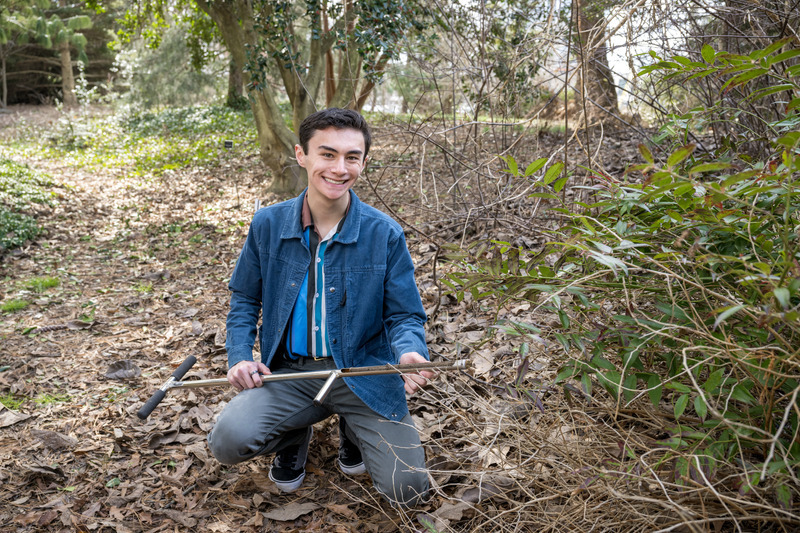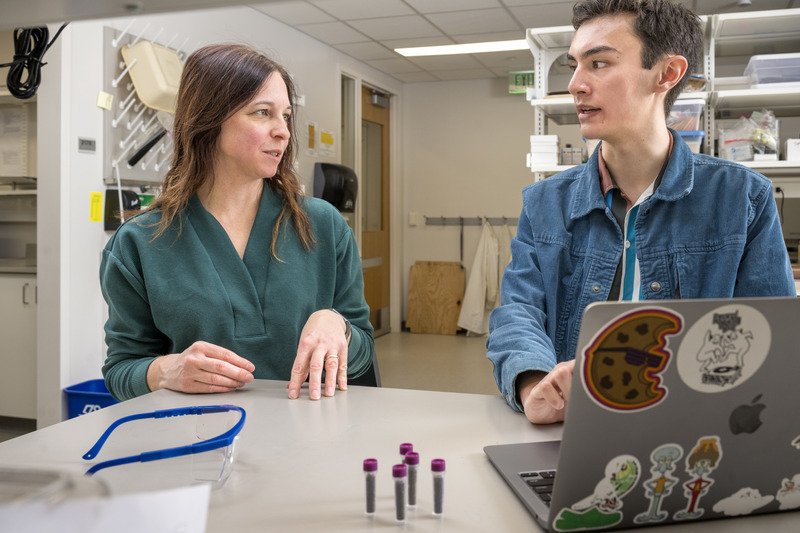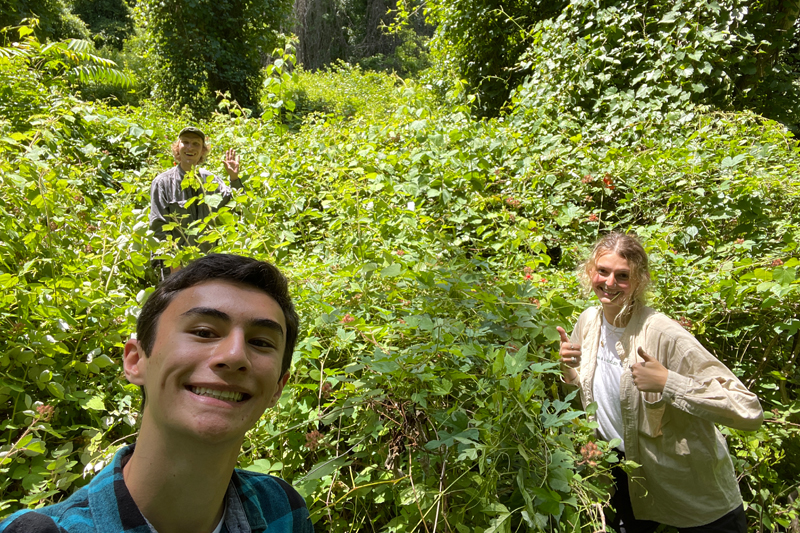


Making an impact
Photos by Kathy F. Atkinson and courtesy of Derek Wu March 22, 2024
Undergraduate student Derek Wu examines how tiny organisms change the world
When University of Delaware senior Derek Wu was a child, he and his family visited the Maryland Zoo in Baltimore every year, where he would sit and watch the elephants for a long time. He wanted to protect them after learning about their threatened extinction.
“I loved the big animals,” he said. “They seemed magical, and I decided I wanted to be a conservation biologist.”
But then Wu entered UD, and the introduction to microbiology course caught his eye.
“I wondered about what life is like at that scale, and I thought the interactions between plants, animals and bacteria seemed cool,” he said. “I fell for microbiology, for the organisms you can’t even see that have such a huge impact on humans.”
From the spring semester of his first year, there has been no looking back or second-guessing for Wu. An honors student double majoring in biological sciences and environmental sciences, he has made his mark in the microbiology field, both on and off campus, as a researcher, teaching assistant and author of a textbook chapter.
Microbiology involves several fields, and Wu’s career has involved faculty members in three of UD’s colleges — the College of Agriculture and Natural Resources, the College of Earth, Ocean and Environment and the College of Arts and Sciences.
He also is a 2023 recipient of one of the most prestigious, and oldest, national scholarships for undergraduates in the country. The Goldwater Scholarship Award — up to $7,500 annually for tuition and other costs — supports outstanding sophomore and junior students who intend to pursue research careers in STEM fields: natural sciences, engineering and mathematics.
Intro to microbiology
Wu was a first-year student during the COVID-19 pandemic, and his introduction to microbiology class with Carlton Cooper, assistant professor of biological sciences and Africana studies, was entirely on Zoom. To gain Cooper’s attention, Wu signed in early and asked a lot of questions. By the end of the semester, Wu had succeeded, and Cooper invited him to be his teaching assistant.
“Derek was so confident and easy to connect with,” Cooper said. “He was scoring in the top 2 percent of the course, and I had no idea that he was a freshman or of his potential, or that he would continue to work with me as an outstanding undergraduate teaching assistant.”
Cooper also asked Wu to write exams and then to contribute a chapter to a new textbook he was writing.
“I knew he was an exceptional writer, and he wrote a chapter on extremophiles [microbes that live in extreme environments, such as Antarctica] in five days while participating in an intense summer research program … a lot for anyone, but especially for a college sophomore,” Cooper said.
Cold emails can work out
Research was new for Wu, who grew up in Hereford, Maryland, and whose mother and brother are UD alumni. At an orientation event held via Zoom in March 2020, students and their families were introduced to the research opportunities at UD.
“They kept mentioning you could work with professors and do research,” Wu said. “I thought it was meant for internships or for a job after graduation, but once I knew how accessible it is here, I went full force into it.”
His first research project began in the spring of 2020 — thanks to a cold introductory email he sent to Tara Trammell, the John Bartram Associate Professor of Urban Forestry, who runs research projects on how forests in urban settings interact with that setting. She is now overseeing his senior thesis.

During that spring and summer, Wu explored how human presence in urban areas affects how forests exist. He collected data in Newark’s forests and then worked on a field crew with three undergraduates and two graduate students in forests in Philadelphia, Baltimore and Springfield, Massachusetts.
He not only learned to survey vegetation and collect soil samples, but also how to be part of a research team.
“The group was great, fun, friendly and hardworking,” he said. “I learned about the forests, but also about the social aspect of research — sharing common interests and making connections.”
That summer, the research team visited dozens of sites, and Trammell said Wu was an integral part of the crew.
“There can be harsh conditions — thorns, poison ivy, ticks — and everyone has to be energetic and collegial and still collect data in an accurate way,” Trammell said. “He was impressive.”
Trammell agrees with Wu that research opportunities at UD can make huge differences for students who pursue them, helping them learn what they like and what they don’t, and says she has six to nine undergraduates in her lab at any given time.
Her advice: “Email the professors. Most will be receptive to your specific query about their research.”
That first project opened doors to several others, both on- and off-campus. As an intern in 2022 at the University of Tennessee, Knoxville, Wu worked in a microbiology lab and on a paper that was just accepted for publication by The Journal of Bacteriology.
From soil to sea
In the meantime, Wu became a fixture in UD’s biology classrooms, including those of Jennifer Biddle, a professor in the School of Marine Science and Policy. The connection would lead his research in a new direction.
“Derek was a student in all the classes I teach at UD, and when I realized he had taken them all, I told him I would miss him and suggested he join my lab so we could stay in touch,” Biddle said.
She assigned him to an ongoing bioinformatics-based project, which he could perform remotely since her lab is in Lewes and he is in Newark.
“I knew he had a lot of hands-on lab experience and, since he wanted to be able to publish something, and this project was one of the furthest along for publication,” she said, so it seemed like a good fit. “I work doing data analysis with one of her post-doctoral students who is interested in gut microbiomes on a project where he feeds different fish different diets: plants or fish pellets and asks, ‘How do those diets change what microbiomes live in that fish’s gut?’”
While offering him this position may have been unusual, Biddle knew he would be right for the post.
“Derek is an excellent student, likely one of the top I’ll ever meet,” she said.
Wu spent last summer at the Mote Marine Laboratory and Aquarium in Sarasota, Florida, where he worked with marine microbiology for the first time. He learned new techniques as he worked with sediment samples, grew bacteria from them, and then screened them, testing to see if bacteria he grew produced compounds that inhibited the growth of drug-resistant pathogens.
“We worked with MRSA for example, and we found plenty of bacteria that inhibited MRSA’s growth. I learned that marine sediments are a great source of bacteria that could be candidates for drug discovery,” he said. “It was really exciting.”
Looking ahead
As a senior, Wu is back where he began — working with Trammell on his senior thesis. Wu is studying soil samples from beneath two species of shrubs in Newark, processing the samples for microbial data to figure out what bacteria are living there. The questions he has asked: Are invasive shrubs facilitating a change in what bacteria live in the soil? Are they changing the microbial communities beneath them? And if so, how?
“From his first email, he has been unique. He is specific and digs in intellectually, and was an honors thesis student from the start,” Trammell said.
“I’ve been fortunate with the labs I’ve been placed in, the people I’ve connected with and chosen as mentors. And fortunate to have interacted with professors willing to have undergrads take a shadowing role. And if I want to spin off a topic or do my own, they’ve been willing to do that, too,” Wu said.
After his May graduation, Wu will no doubt make an impact at one of the four universities where he has been accepted and where he will study for his doctoral degree in microbiology or population biology, ecology and evolution. His end goal is to teach at the university level.
“The hallmark of my undergrad experience has been the ability to combine research, teaching and mentorship, the signature of work in academia,” he said. “I look forward to ongoing interaction with students, guiding and helping them figure out their lives and achieving success in whatever way they define it through experiential opportunities. I want to have that impact.”

Contact Us
Have a UDaily story idea?
Contact us at ocm@udel.edu
Members of the press
Contact us at 302-831-NEWS or visit the Media Relations website

